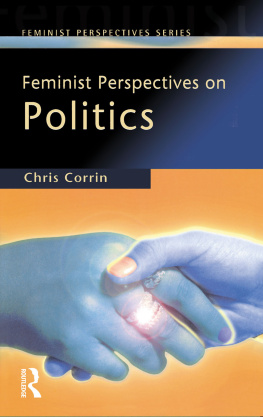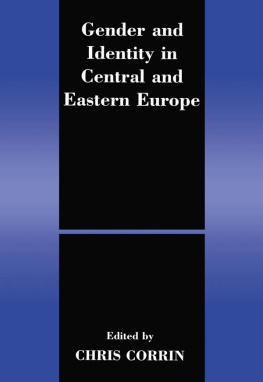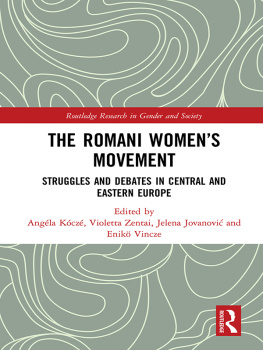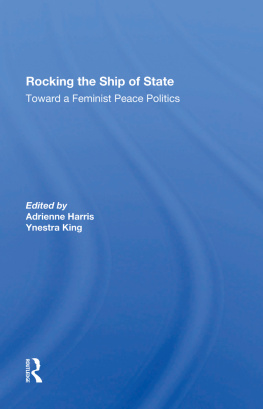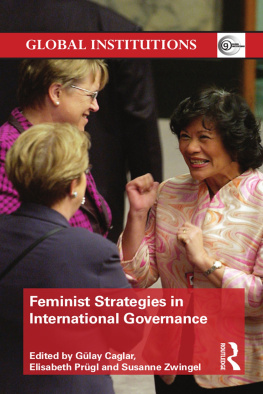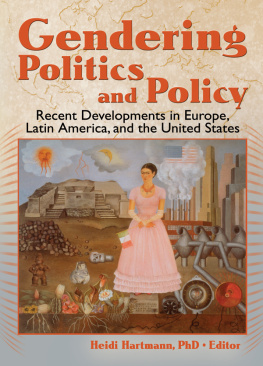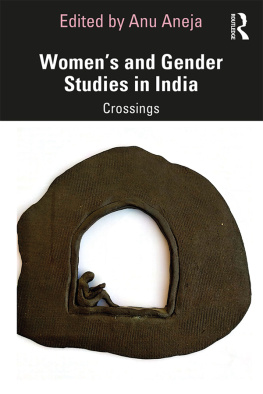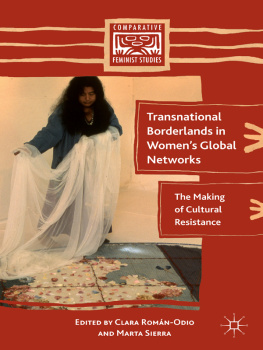Feminist Perspectives on Politics
FEMINIST PERSPECTIVES SERIES
Series Editors:
Professor Pamela Abbott, University of Teesside
Professor Claire Wallace, University of Derby and Institute for
Advanced Studies, Vienna
Published Tides:
Feminist perspectives on the body
Barbara Brook
Feminist perspectives on language
Margaret Gibbon
Feminist perspectives on ethics
Elizabeth Porter
Forthcoming Titles:
Feminist perspectives on postcolonialism
Maryanne Dever and Denise Cuthbert
Feminist perspectives on disability
Barbara Fawcett
Feminist perspectives on domestic violence
Laura Goldsack and Jill Radford
Feminist perspectives on environment and society
Beate Littig and Barbara Hegenbart
FEMINIST PERSPECTIVES SERIES
Feminist Perspectives on Politics
Chris Corrin
First published 1999 by Pearson Education Limited
Published 2014 by Routledge
2 Park Square, Milton Park, Abingdon, Oxon OX14 4RN
711 Third Avenue, New York, NY 10017, USA
Routledge is an imprint of the Taylor & Francis Group, an informa business
Copyright 1999, Taylor & Francis.
The right of Chris Corrin to be identified as author of this Work has been asserted by her in accordance with the Copyright, Designs and Patents Act 1988.
All rights reserved. No part of this book may be reprinted or reproduced or utilised in any form or by any electronic, mechanical, or other means, now known or hereafter invented, including photocopying and recording, or in any information storage or retrieval system, without permission in writing from the publishers.
Notices
Knowledge and best practice in this field are constantly changing. As new research and experience broaden our understanding, changes in research methods, professional practices, or medical treatment may become necessary.
Practitioners and researchers must always rely on their own experience and knowledge in evaluating and using any information, methods, compounds, or experiments described herein. In using such information or methods they should be mindful of their own safety and the safety of others, including parties for whom they have a professional responsibility.
To the fullest extent of the law, neither the Publisher nor the authors, contributors, or editors, assume any liability for any injury and/or damage to persons or property as a matter of products liability, negligence or otherwise, or from any use or operation of any methods, products, instructions, or ideas contained in the material herein.
ISBN 13: 978-0-582-35638-2 (pbk)
British Library Cataloguing-in-Publication Data
A catalogue record for this book is available from the British Library
Typeset by 35 in 10/12pt New Baskerville
For Margaret, with love and thanks
Contents
Series Editors Preface
The aim of the Feminist Perspectives series is to provide a concise introduction to different topics from a feminist perspective. The topics were chosen as being of interest for students on a range of different degree courses and in a range of different disciplines. They reflect the current interest in feminist issues and in womens studies in a wide range of fields. The series aims to provide a guide through the burgeoning and sometimes rather arcane literatures which have grown around various feminist topics. The texts are written by experienced teachers and academics providing lively and interesting accounts of topics of current interest. They include examples and case studies or statistical information where relevant in order to make the material more accessible and stimulating.
The texts contain chapter outlines and summaries for convenient, quick access. There are also suggestions for further reading.
We are especially pleased to have a text on Politics in the Feminist Perspectives series. Politics has been an area of special concern for feminists indeed feminism is itself political. As Chris Corrins text makes explicit, feminists have been concerned to demonstrate that the subordination of women by men is a political act. Furthermore they have demonstrated that not only has womens mainstream political activity been ignored in male-stream analysis but that much political activity by women has been seen as a concern with ethical or personal issues rather than political ones. Women have been portrayed as less concerned with politics than men and less able to be political. The outcome is that issues that are of concern to women are defined as not political and women are then said to be less interested in politics, less knowledgeable about politics and less adept at politics than men, and that issues which are of concern to women are seen as unimportant or trivial, or as moral rather than political.
Claire Wallace and Pamela Abbott
At the outset I decided I would write this book for my students, especially those taking Ordinary Politics, the first year course at Glasgow University. At the conclusion I realise I have written this book for myself, to better understand the connections. I wish to make in studying and teaching politics from a feminist perspective. I am very grateful for the insights given from students over the years particularly those who have undertaken my courses on Feminist Thought and Political Theory and our Womens Studies courses.
In trying to achieve a wholeness within this book I realise that my understanding of politics, as actively trying to change injustice, centrally involves my feelings and thinking about politics. If there had been more space within this short book I would have been pleased to include some of the wonderful political poetry that feminists have written to support, sustain and sister women. As Audre Lorde pointed out over 20 years ago:
For women, then, poetry is not a luxury. It is a vital necessity of our existence. It forms the quality of the light within which we predicate our hopes and dreams toward survival and change, first made into language, then into idea, then into more tangible action. As they become known to and accepted by us, our feelings and the honest exploration of them become sanctuaries and spawning grounds for the most radical and daring of ideas. They become a safe-house for that difference so necessary to change and the conceptualization of any meaningful action.
(Lorde 1996: 96)
As is often the case, Audre manages to capture my thoughts, in the potential for change, which is the cornerstone of our actions. Several friends and colleagues helped with this project in their willingness to read draft chapters, generally at short notice. I thank Chris Berry, Cordelia Ditton, Anita Franklin, Eleanor Gordon, Barbara Littlewood, Neeraj Malhotra, Julie Matthews and Susan Stewart. My thanks also go to Jeanette Berrie for her help in getting the typescript into a readable order. I would be very pleased to hear from anyone who wants to write any comments on this book.
We are grateful to the following copyright holders for permission to reproduce copyright material.
Table 1.1 reproduced with permission of Macmillan Press Ltd. from Hague, R., Harrop, M. and Breslin, S. (1992) Comparative Government and Politics: An Introduction Basingstoke: Macmillan, Table 7.1
Figure 4.1 reproduced with permission of New Internationalist New Internationalist (1985) Women: A World Report

